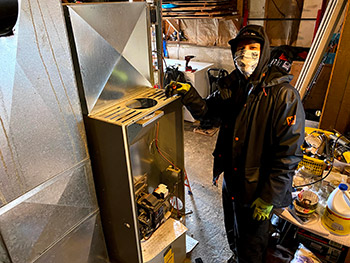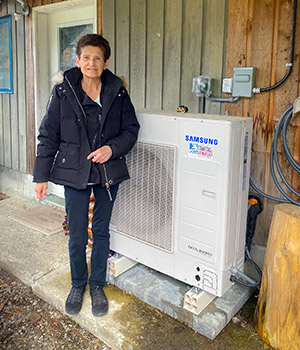
Summary
Homes in Bella Bella, B.C., have historically been heated using expensive, GHG-emitting oil furnaces. The Heiltsuk Nation and partner Ecotrust Canada have been retrofitting the community’s housing with high-efficiency heat pumps to lower emissions, increase comfort and reduce residents’ fuel costs.
Background
The Heiltsuk (Haíłzaqv) First Nation is based in the town of Bella Bella (Wágḷísḷa), on the central coast of British Columbia. This island community has no road links to the rest of the province and goods including fuel must be shipped in. Until recently, more than 300 Bella Bella homes were heated primarily by oil furnaces. Not only do such systems produce high greenhouse gas (GHG) emissions, but they are expensive, inefficient and even dangerous to run, producing unhealthy localized pollution.
In partnership with the nonprofit Ecotrust Canada, the Heiltsuk First Nation completed a pilot project to install high-efficiency ductless (wall-mounted) heat pumps in 37 homes, to replace their oil furnaces. Participants were happy overall with these retrofits: not only did they significantly lower emissions and increase comfort and convenience, but they lowered annual heating costs by more than $1,500 per household. They also had the advantage of adding cooling capabilities, which have become more necessary as the climate warms. However, some residents said that heat distribution from these wall-mounted units was uneven, and the team wondered if there was a better solution.
The challenge
Heating is responsible for more than half of the GHG emissions from Bella Bella’s homes. Switching more households to electric heat pumps was a clear opportunity to bring the community closer to its net-zero ambitions, especially as the town has access to electricity from a nearby dam that has been running below capacity.
With an ultimate goal of retrofitting all the homes in Bella Bella, Ecotrust and the Heiltsuk First Nation wanted to test a different type of electric heat pump system for heating and cooling so that they could assess which option would be the best choice for the rest of the community.
Approach

With financial support from FCM, the team retrofitted 62 homes with ducted central air-source heat pump systems, so that their performance could be compared with the ductless units already installed. They chose variable-speed Samsung heat pumps for their high efficiency.
To help with assessment and analysis and to guide future efficiency improvements, they completed EnerGuide Evaluations on 23 homes.
Since ducted central air-source systems use more electricity than ductless units, the team is also looking at how the increased demand might affect the local hydroelectric facility.
Results
In total, through both initial project phases, 98 homes have been retrofitted with heat pumps. Of these, 93 were previously using oil furnaces and 5 electric.
While data are still being gathered, initial estimates are that the oil-to-heat pump conversions will result in an annual per-home savings of 1,771 L of fuel and 5 tCO2e. For all 93 homes, that could total a reduction of 6,975 tCO2e over the heat pumps’ estimated 15-year lifetime. As for the homes that switched from electric furnaces, one preliminary data point showed a 28 percent reduction in electricity usage over the previous year.
Benefits
Thanks to the heat pump program, residents are experiencing a number of quality of life–related benefits:
- Increased comfort
- The ability to cool their homes in summer
- Fewer localized emissions (fumes)
- Lower heating-related costs
Preliminary results show that the ducted central air-source heat pump trial in particular has greatly improved the quality of both heating and cooling in residences. For example, one elder expressed that they had forgotten what it was like to have a warm home.
Lessons learned
It’s important to prioritize excellent project management to make the process as streamlined as possible, and to do a thorough job in the research phase of selecting equipment and contractors so that quality is as high as possible and everyone involved is invested in achieving good results.
Next steps

The Heiltsuk Nation’s ultimate goal is to transition all homes in the community to high-efficiency electric heat pumps for both heating and cooling. After gathering 12 months of data on performance of the ducted systems, the team and community are moving forward on remaining retrofits, with either ductless or ducted heat pumps as appropriate for each home.
Another goal is to make other energy-efficiency improvements. Air sealing, for instance, was identified as a high-potential upgrade and work is already underway to complete air sealing in homes with the new heat pumps.
In addition, one member of Heiltsuk Nation is training to become a certified Energy Advisor so that they can take the lead on improving efficiency in local and regional housing. This is part of the community’s overall work in climate action, as they work to transition to clean energy sources.
Want to explore all GMF-funded projects? Check out the Projects Database for a complete overview of funded projects and get inspired by municipalities of all sizes, across Canada.
Available funding
We support projects at various stages of development through grants and loans. Funding amounts are based on total eligible costs. Further details on eligible costs are provided on individual funding pages.
Business case: Community Energy Systems
Funding to assess viable community energy projects and their business models
Read moreStudy: Community Energy Systems
Funding to outline the design of a proposed community energy system
Read moreCapital project: Community Energy Systems
Funding to construct, commission and rapidly deploy a community energy system
Read more
